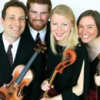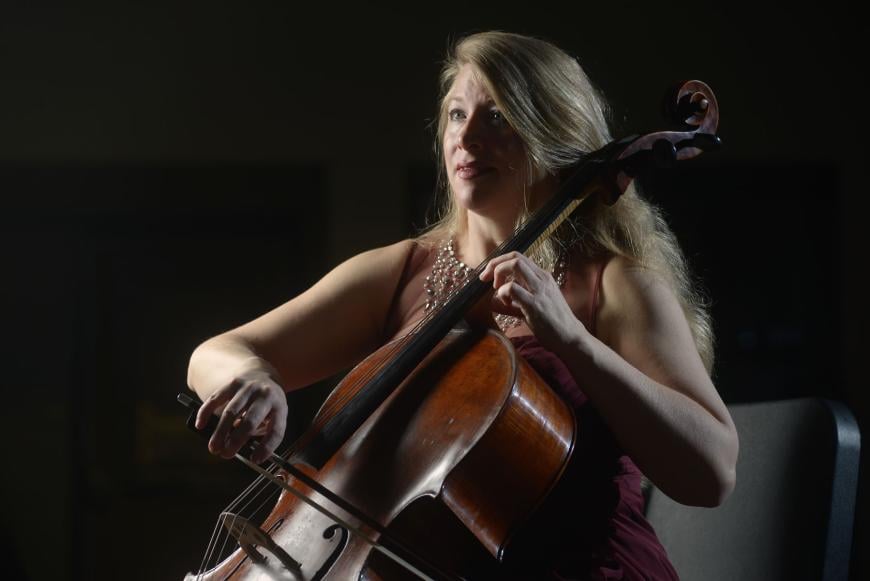
It’s not outrageous to assume one of the most enduring, long-term and heartfelt relationships in the life of cellist Jennifer Kloetzel is with Beethoven. After all, she first met the masterful composer at the tender age of 8, when her piano teacher placed on her music stand the formidable Sonata for Piano and Cello No. 2 in G Minor, Op. 5.
In a phone conversation, she says, “I look back on that and think, ‘Wow, that was a bold thing to do.’”
Tackling the sustained Adagio section of that sonata likely set the course for Beethoven-oriented navigation Kloetzel has pursued while studying at the Juilliard School, as a Fulbright Scholar, in concerts throughout the United States, Europe, and Asia as a soloist and chamber musician, and most notably, as a founding member and cellist for 20 years of the San Francisco-based Cypress String Quartet. Kloetzel has appeared at the Lincoln Center, the Kennedy Center for the Performing Arts, the Chautauqua Institute, the Ravinia Festival, the Lobkowicz Palaces in both Vienna and Prague, and colleges and conservatories worldwide. While continuing to perform and record as a solo and guest cellist, Kloetzel is professor of cello, head of performance, and head of strings at UC Santa Barbara.
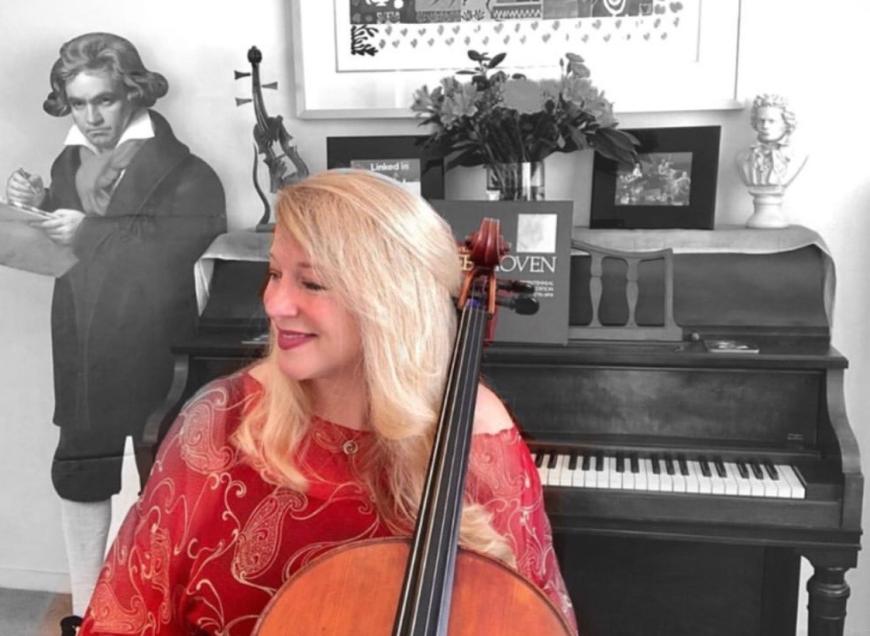
With 36 CD releases to date, her recent recordings include the entire cycle of Beethoven Quartets and Brahms Sextets on the Avie label, and in 2022, Beethoven, The Conquering Hero — Beethoven’s complete works for cello and piano with Robert Koenig. The three-CD set is packaged in a special digipack with liner notes by Beethoven scholar William Meredith and was recorded at Skywalker Sound.
Told that I had listened to her new release more than once prior to our conversation, Kloetzel laughs and says, “That’s three hours several times over! I thought I felt some special energy coming from the East Bay.”
In addition to playing most of these works for decades, what was the genesis for this project?
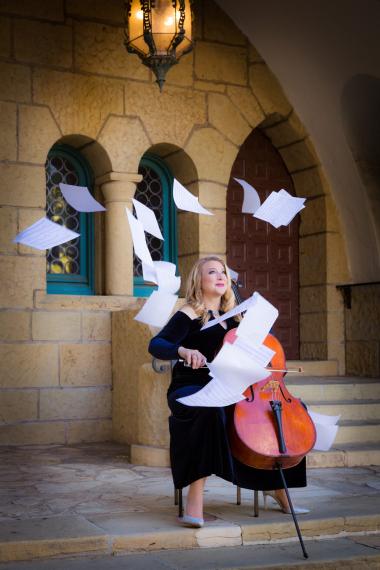
I’ve been performing Beethoven from a very young age. Early on, he became one of the composers who are my favorites. At this point in time, it’s been a constant in my life. I’ve performed and studied all of his works for cello. For 20 years with the Cypress String Quartet we performed and recorded all the string quartets and I was in a very serious piano trio and performed all the piano trios and the triple concerto, I’ve played them many times — and all of the sonatas and variations of course.
When the quartet disbanded [in 2016] and I was looking at what I’d be doing next, one of the things — when I got the job as professor at UC Santa Barbara where Bob was my colleague — Bob and I started played together. We knew each other from New York and when we reconnected and played the Third Cello Sonata together, things just clicked. Looking forward to so many projects I wanted to do, one of them was I really wanted to record these works I’d been studying since I was eight years old. I knew that I wanted to record them with Bob.
And the timeline?
It takes a while to plan a big project and COVID didn’t help. We began to record in August 2019, and of course, with nine works, you can’t record them all at once. We did some in August, some in December, and then were supposed to do more in the spring of 2020, so things got moved until the recording studio got opened up again. And then there’s all the production, so it took a while.
Did some works require a simple refresh and others cause you to strip the cello part down to the basics and rebuild?
The only work on this that was new entirely to both of us was the horn sonata. What to include is always a question. When you look at collections of Beethoven’s cello works it will usually be the five sonatas alone, or five sonatas and the three variations. I took a really thorough look at what’s out there and started noticing there were some collections that included versions I didn’t even know. There’s a version of the Op. 3 String Trio which I believe is Op. 64 now, but it’s [Ukrainian pianist] Alena Cherny’s version of it for piano and cello. And then there’s a version of the “Kreutzer” sonata, the violin sonata, one of the greatest, also arranged by Cherny. I spoke with Bob — who has performed it — about doing that and he said, “I’m not learning that piece in a different key for performing with cello.” And then I looked at what other things Beethoven wrote.
When Beethoven wrote the horn sonata in the 1800s and sent it to the publisher, he included a cello part. That might have been because he just wanted to make more money. Not many people were playing a horn and maybe more people would be interested in it [for cello]. But it’s a lovely portrayal of that piece, so I thought to include it with the collection in mind. That piece was something we had to find our way in. Other than that, we spent some time on one of the big sonatas, the F Major, that Bob had never played. We had a running joke — you know it has a very big piano part — that he would maybe send someone else to play it on the day we were going to record it.
Did you find increased understanding or alter your approach to any of the sonatas or all of them collectively because they were a part of this one large project? Are there newfound perspectives or skills or aspects of the compositions that for the first time revealed themselves during the making of these three CDs?
One of the fun things of doing a collection like this is seeing a composer develop over time. When the Cypress Quartet did all of the string quartets, we did them in backwards order from most recent to oldest. There is something important happening when you’re figuring out how to put them on the disc.
I decided to release these in chronological order. I thought it would be interesting for myself and for listeners as well to take it from the beginning to the end and notice what happens over time. The entire first disc is all 1796, so that was Beethoven playing the piano parts himself and the cello parts are not as thoroughly fleshed out. He had heard the Duport Brothers who were cellists to the Prussian court — that’s a job I’d like to have, if you hear of anything like that, please let me know — and they were amazing players. Beethoven thought, “I could write for them.” Before this time, he wasn’t writing any complicated parts for cello. He didn’t think it was a solo instrument.
When we move to disc two, we’re shifting a little bit. That’s 1798 to 1801: the Mozart variations and the horn sonata are his whole nod back to Mozart. And then we get to disc three, where we come into his heroic middle period. It’s Opus 69, 1808, and what many people consider to be first equal partnership between piano and cello. He starts the sonata with the cello alone; it stakes the claim that this is going to be different. It’s not like the Handel variations; it’s not until the 10th variation when the cello gets to play the main theme. Even then, we are shadowed in canon within the left hand of the piano. In Opus 69 he is making them equal partners. Then, we jump to 1816, and you really see a difference. First of all, they’re both shorter and the transitions are not there anymore. He’ll just go from key to key and he’s saying, “We’re going to dramatically do this.” It’s surprising and clever, the way the dialogue works.
Did you realize or track the development more explicitly because you were recording them in chronological order instead of arranging them in other pairings?
Yes, definitely. Because when I decided in the first two sonatas that I was going to do all the repeats, you feel all the bigness and the slowness with which he develops things. And then when you come to later works, [you notice] they’re so much more concise. Looking at it that up-close, immersed in that world, yes, you see all of that. It was exciting to feel that. Noticing the development of this composer, I was noticing all the fugues in the last two sonatas.
The final sonata ending with that huge fugue has baffled people for centuries. In college I wrote a paper about these last two sonatas and how they were a turning point for Beethoven from the middle period where everything was grand and large. And then it was, “we’re going to pare it down to its essence.” I loved the fact that in the fifth sonata we finally get almost a full-length solo, not quite, but it’s a big hunk. I had read that Beethoven did not believe the cello could sustain a long enough line to do a slow movement. It’s a heavy, big, almost 10-minute section with extra markings; the titles Beethoven had started writing in on his scores.
Pianist Robert Koenig is known for his collaborative skills, but tell me about the intangibles and technical aspects that make him a great choice particularly, for you and for a Beethoven project? What did you most want from a pianist when recording this repertory?
From the first moment we started playing together, our musical sensibilities were so similar. It comes from our chamber music backgrounds. He’s this great collaborative pianist, which means chamber music is everything. He’s trying to make sure he’s fitting with the other person. Coming from this chamber music world, I look at everything as playing chamber music. If I’m playing a concerto with an orchestra, it’s chamber music. I’m looking at what my part is: Am I playing with flute here? Am I playing with clarinet here?
We have a partnership based on give and take. From the first day it was easy, simple, we saw eye-to-eye. Sometimes we discuss tempos, but my mother heard us perform together — she’s trained as an opera singer — and said to me it was kind of like a miracle, like a hand and a glove and playing tougher as if you were sharing one mind. That’s what a partnership is: you trust your partner so well that if they do something interesting, you want to go with them. If we’re really listening to each other, magic happens.
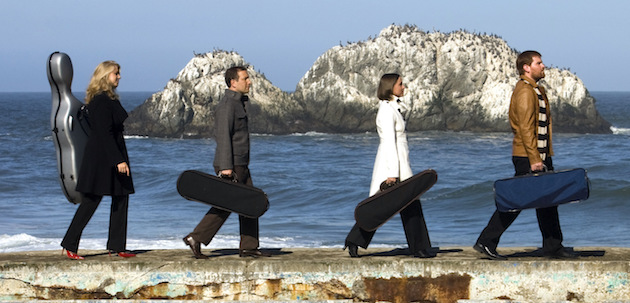
Talk to me about the pleasures and the sacrifices made by shifting to an academic position at UCSB after being with Cypress String Quartet for 20 years. What did you give up, what did you gain?
After 20 years in the quartet, with mostly a performance-based career, now I find better balance. The pandemic notwithstanding, I’m still performing as much as before, but I’m dividing it with teaching and community hours. I had reached the point where I wanted to share. In my graduate seminars, we’re discussing all the aspects of a career, not just looking at the works of Beethoven and other great masters, but also commissioning new music, recording, becoming an entrepreneur.
All of that comes from my experiences, and I love being able to share that with the next generation. When I’m working on a piece like the Elgar concerto and I have students working on it, we’re solving tougher problems. We’re looking at it and I’m saying, here’s how I approach this problem. Let’s look at how you solve it. That’s endlessly fascinating and I think has richly informed my playing.
A few final thoughts on your commitment to new works by artists like Michael Franti, Elena Ruehr, and Jeff Kloetzel, a family member also in the business?
Living composers inhabit a different world and to me, they inform my working on older composers. Elena’s work informs my work on Beethoven because you realize composers are human. They work with an imperfect notation system where they’re trying to put something down. Watching Elena’s process reminds me that it’s important to be searching for the Beethoven of today.
Great composers who speak to me, I want to make sure I champion them, commit to them. I’m going to be spending a lot of time in their world, so have to believe in their voice and how they craft things. Working with Franti, watching his process; it relates to this conquering hero idea and the title of my CD. It’s not about conquering people; it’s about conquering life’s tribulations and finding joy. Working with Michael, it was him coming out of dark times and looking for joy. I loved being a part of that world. Everybody Deserves Music: I loved the idea behind that track. No matter what’s going on in your life, we all deserve music.
And Jeff Kloetzel?
He’s my brother, a singer/songwriter. We have music in the family for sure. My sister is Melanie Kloetzel, a modern-dance choreographer. The very first piece she choreographed I was on stage with her, siting in the middle of the stage. When I play Bach suites, I think about movement and rhythm and how that impacts them. My other brother works for The Nature Conservancy. He’s the land steward for the upper northwest quadrant of Montana. He has single-handedly preserved millions of acres of land from development. I like to say he’s saving us a place where we can all make art later.




